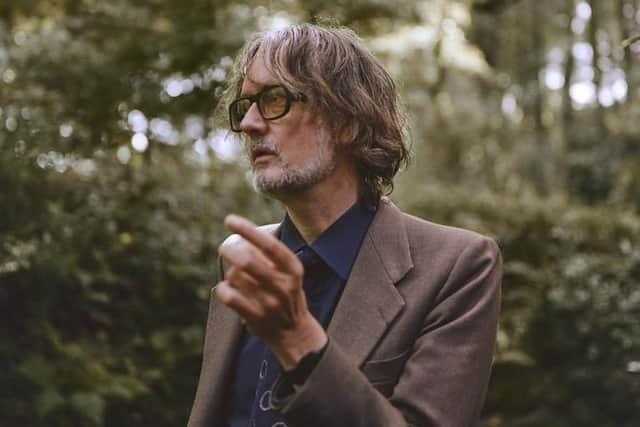Edinburgh International Book Festival round-up: Jarvis Cocker | Ricky Ross | Graeme Macrae Burnet
Taking the main stage at the Book Festival on Thursday night, Jarvis Cocker could have passed for a social sciences professor at a red-brick university: glasses, floppy hair, greying stubble. The Pulp frontman, however, turned out to be a splendid raconteur, not just telling stories but acting them out as well.
Since his book, Good Pop, Bad Pop, was inspired by the memorabilia stored in the attic of a house where he once lived, he treated us to a demonstration of how he crawled about in the low-ceilinged roof space. He was out of his seat again to show us how he once tried to impress a girl by climbing round the outside of a building (and ended up in hospital), and again to explain how the bassist fell off the stage during one of Pulp’s first gigs.
Given all this entertainment, there wasn’t much time left to talk about the book, though we did learn about a couple of his attic finds: a school exercise book he had when he was 15 in which he designed outfits for the band, and his ticket to the John Peel Roadshow at Sheffield Polytechnic in 1980 when he handed Peel a copy of Pulp’s newly minted demo cassette (and the rest is history). Cocker even found a way to circumnavigate the best audience question of the night: “How many common people have you slept with?”


In a rock’n’roll evening at the Book Festival, Cocker arrived hot on the heels of Deacon Blue frontman, Ricky Ross, talking about his memoir Walking Back Home. Described by chairperson Nicola Meighan as “a reluctant and conflicted rockstar”, Ross said he had no desire to write a history of the band, but enjoyed the process of reflecting on his story, particularly the family and friends who most influenced him.
It was an event which sparkled with moments: the arrival of the first record player in his parents’ staunchly Christian home; the rebellious cousin who came to stay bringing with her The Beatles’ Abbey Road, and Ross’s first (solo) gig, in a basement near here during the Fringe in 1982, when he learned that too many “gloomy” songs do not make a happy crowd.
There was the day the call (finally) came from an A&R man wanting to sign Deacon Blue, and the inspiration for the band’s anthem, Dignity (living in a street on Glasgow’s Southside with a Cleansing Department depot at the end). But what stood out most was the warmth of the response from the audience, both from people who knew Ross personally, and from those for whom Deacon Blue had provided the soundtrack of their lives.
A writer who operates adeptly at the intersection of fact and fiction is Graeme Macrae Burnet, whose fourth novel, Case Study, has just been longlisted for the 2022 Booker Prize. Interviewer Jenny Niven described his books as puzzles which the reader must disentangle and, judging by some of the audience questions, one or two were still disentangling the webs in his Booker-shortlisted 2015 novel His Bloody Project.
Case Study, about a young woman in 1960s London who becomes a patient of radical psychotherapist Collins Braithwaite, was, he said, informed by reading hundreds of psychiatric case studies over a period of decades. Then he had to find the voice of his protagonist, the buttoned up “Miss X”, poring over women’s magazines from the 1960s in Glasgow’s Mitchell Library to develop her prissy schoolgirl vocabulary.
He took issue with the claim that his books are avant-garde or postmodern, arguing that the intertextual novel and the unreliable narrator are as old as the novel itself: “I am postmodern like Wilkie Collins, James Hogg or Robert Louis Stevenson.” Susan Mansfield